Psychology of Behaviour: Perspectives, Influences, and Services
VerifiedAdded on 2023/01/13
|8
|2618
|65
Report
AI Summary
This report delves into the psychology of human behaviour, examining various psychological perspectives such as psychodynamic, behavioural, and cognitive approaches, and how they explain human actions and thoughts. It defines research on group influence, conformity, and obedience, and analyses their impact on behaviour. The report outlines factors that may contribute to criminal activity, including family environment, substance abuse, and adverse childhood experiences. Furthermore, it explores how psychological perspectives can be applied by individuals and teams within public services to elicit desirable behaviours, reduce negative behaviours, and improve mental health. The report concludes by emphasizing the importance of understanding these perspectives for effective interventions in public services and provides techniques that could be used by care professionals.
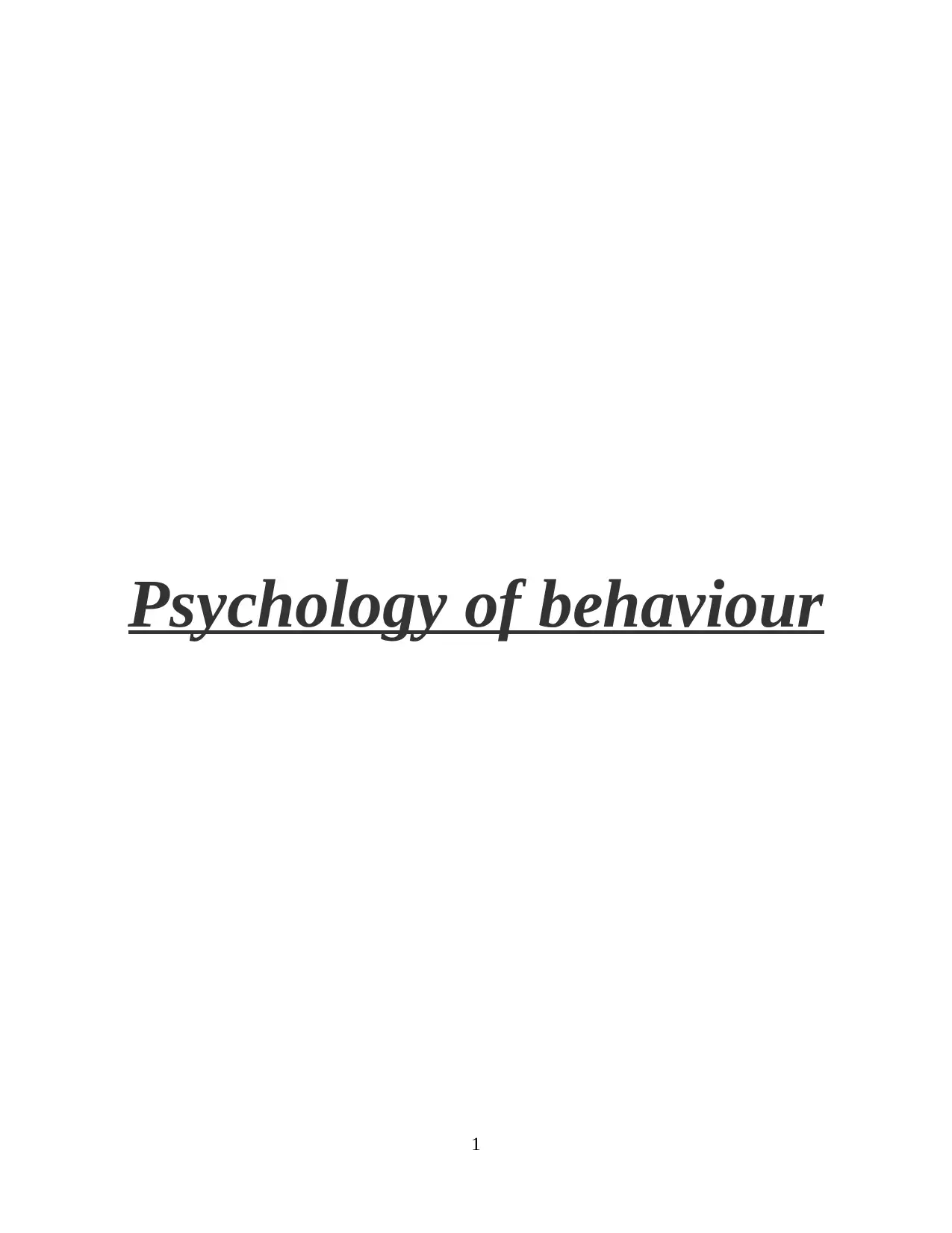
Psychology of behaviour
1
1
Paraphrase This Document
Need a fresh take? Get an instant paraphrase of this document with our AI Paraphraser
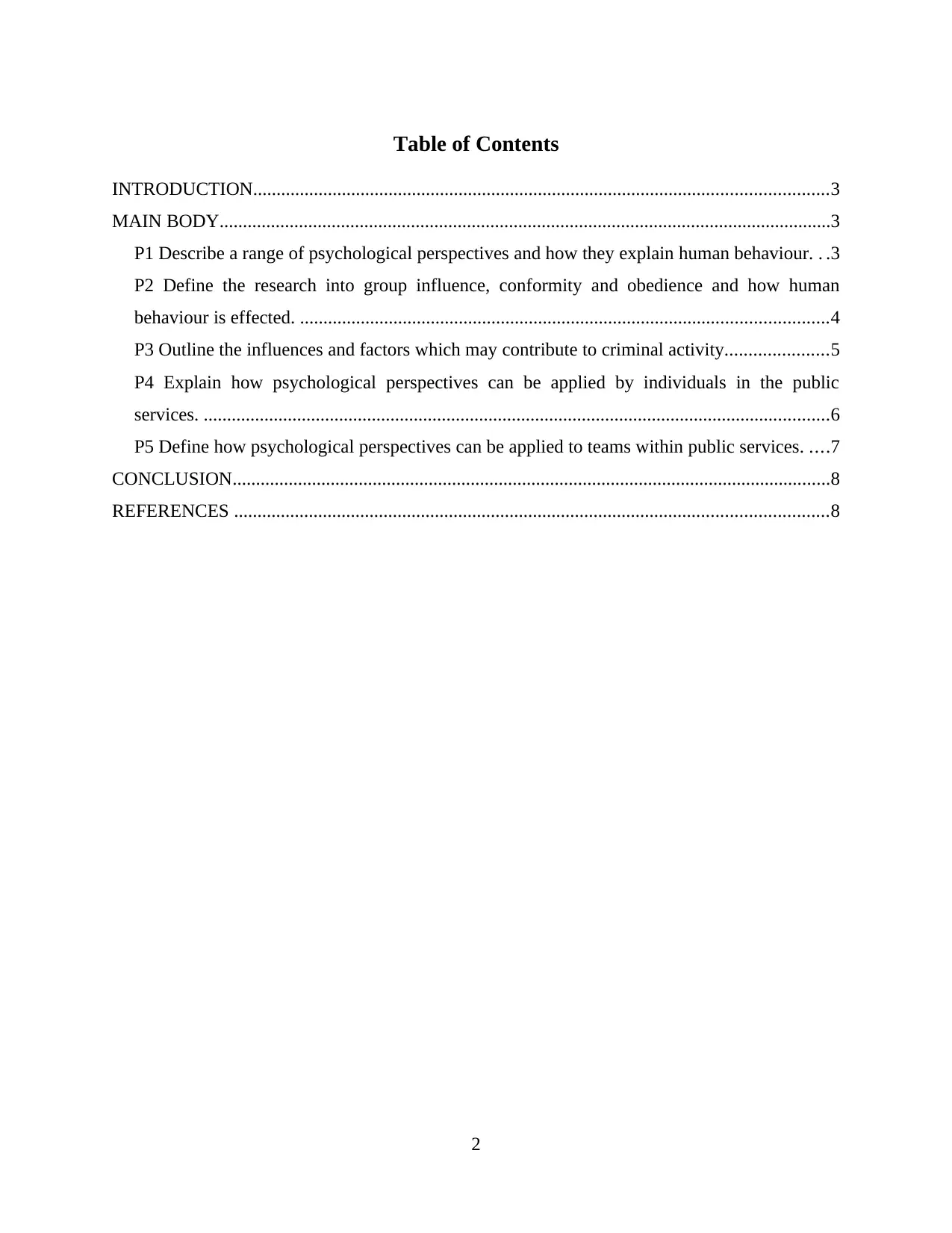
Table of Contents
INTRODUCTION...........................................................................................................................3
MAIN BODY...................................................................................................................................3
P1 Describe a range of psychological perspectives and how they explain human behaviour. . .3
P2 Define the research into group influence, conformity and obedience and how human
behaviour is effected. .................................................................................................................4
P3 Outline the influences and factors which may contribute to criminal activity......................5
P4 Explain how psychological perspectives can be applied by individuals in the public
services. ......................................................................................................................................6
P5 Define how psychological perspectives can be applied to teams within public services. ....7
CONCLUSION................................................................................................................................8
REFERENCES ...............................................................................................................................8
2
INTRODUCTION...........................................................................................................................3
MAIN BODY...................................................................................................................................3
P1 Describe a range of psychological perspectives and how they explain human behaviour. . .3
P2 Define the research into group influence, conformity and obedience and how human
behaviour is effected. .................................................................................................................4
P3 Outline the influences and factors which may contribute to criminal activity......................5
P4 Explain how psychological perspectives can be applied by individuals in the public
services. ......................................................................................................................................6
P5 Define how psychological perspectives can be applied to teams within public services. ....7
CONCLUSION................................................................................................................................8
REFERENCES ...............................................................................................................................8
2
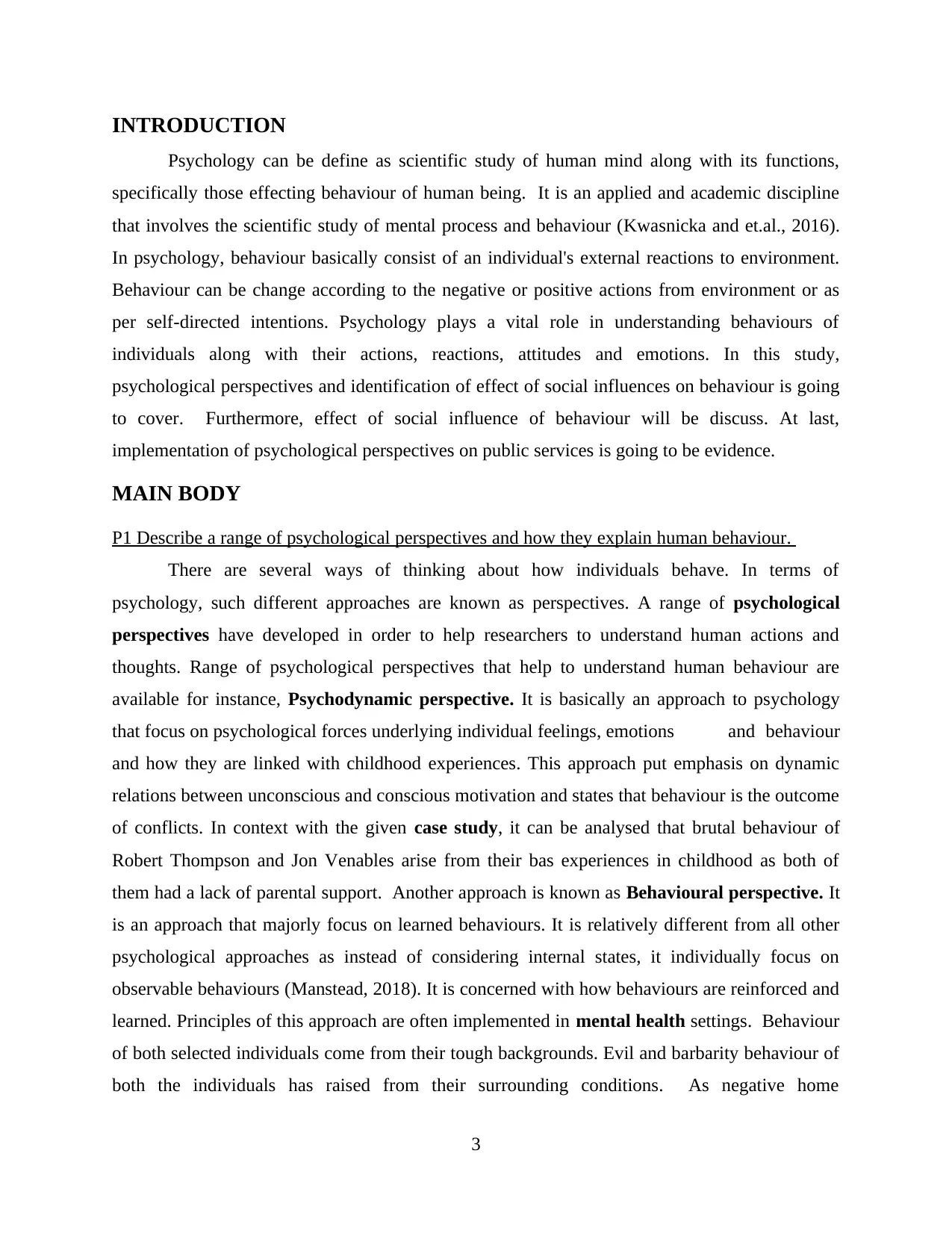
INTRODUCTION
Psychology can be define as scientific study of human mind along with its functions,
specifically those effecting behaviour of human being. It is an applied and academic discipline
that involves the scientific study of mental process and behaviour (Kwasnicka and et.al., 2016).
In psychology, behaviour basically consist of an individual's external reactions to environment.
Behaviour can be change according to the negative or positive actions from environment or as
per self-directed intentions. Psychology plays a vital role in understanding behaviours of
individuals along with their actions, reactions, attitudes and emotions. In this study,
psychological perspectives and identification of effect of social influences on behaviour is going
to cover. Furthermore, effect of social influence of behaviour will be discuss. At last,
implementation of psychological perspectives on public services is going to be evidence.
MAIN BODY
P1 Describe a range of psychological perspectives and how they explain human behaviour.
There are several ways of thinking about how individuals behave. In terms of
psychology, such different approaches are known as perspectives. A range of psychological
perspectives have developed in order to help researchers to understand human actions and
thoughts. Range of psychological perspectives that help to understand human behaviour are
available for instance, Psychodynamic perspective. It is basically an approach to psychology
that focus on psychological forces underlying individual feelings, emotions and behaviour
and how they are linked with childhood experiences. This approach put emphasis on dynamic
relations between unconscious and conscious motivation and states that behaviour is the outcome
of conflicts. In context with the given case study, it can be analysed that brutal behaviour of
Robert Thompson and Jon Venables arise from their bas experiences in childhood as both of
them had a lack of parental support. Another approach is known as Behavioural perspective. It
is an approach that majorly focus on learned behaviours. It is relatively different from all other
psychological approaches as instead of considering internal states, it individually focus on
observable behaviours (Manstead, 2018). It is concerned with how behaviours are reinforced and
learned. Principles of this approach are often implemented in mental health settings. Behaviour
of both selected individuals come from their tough backgrounds. Evil and barbarity behaviour of
both the individuals has raised from their surrounding conditions. As negative home
3
Psychology can be define as scientific study of human mind along with its functions,
specifically those effecting behaviour of human being. It is an applied and academic discipline
that involves the scientific study of mental process and behaviour (Kwasnicka and et.al., 2016).
In psychology, behaviour basically consist of an individual's external reactions to environment.
Behaviour can be change according to the negative or positive actions from environment or as
per self-directed intentions. Psychology plays a vital role in understanding behaviours of
individuals along with their actions, reactions, attitudes and emotions. In this study,
psychological perspectives and identification of effect of social influences on behaviour is going
to cover. Furthermore, effect of social influence of behaviour will be discuss. At last,
implementation of psychological perspectives on public services is going to be evidence.
MAIN BODY
P1 Describe a range of psychological perspectives and how they explain human behaviour.
There are several ways of thinking about how individuals behave. In terms of
psychology, such different approaches are known as perspectives. A range of psychological
perspectives have developed in order to help researchers to understand human actions and
thoughts. Range of psychological perspectives that help to understand human behaviour are
available for instance, Psychodynamic perspective. It is basically an approach to psychology
that focus on psychological forces underlying individual feelings, emotions and behaviour
and how they are linked with childhood experiences. This approach put emphasis on dynamic
relations between unconscious and conscious motivation and states that behaviour is the outcome
of conflicts. In context with the given case study, it can be analysed that brutal behaviour of
Robert Thompson and Jon Venables arise from their bas experiences in childhood as both of
them had a lack of parental support. Another approach is known as Behavioural perspective. It
is an approach that majorly focus on learned behaviours. It is relatively different from all other
psychological approaches as instead of considering internal states, it individually focus on
observable behaviours (Manstead, 2018). It is concerned with how behaviours are reinforced and
learned. Principles of this approach are often implemented in mental health settings. Behaviour
of both selected individuals come from their tough backgrounds. Evil and barbarity behaviour of
both the individuals has raised from their surrounding conditions. As negative home
3
⊘ This is a preview!⊘
Do you want full access?
Subscribe today to unlock all pages.

Trusted by 1+ million students worldwide
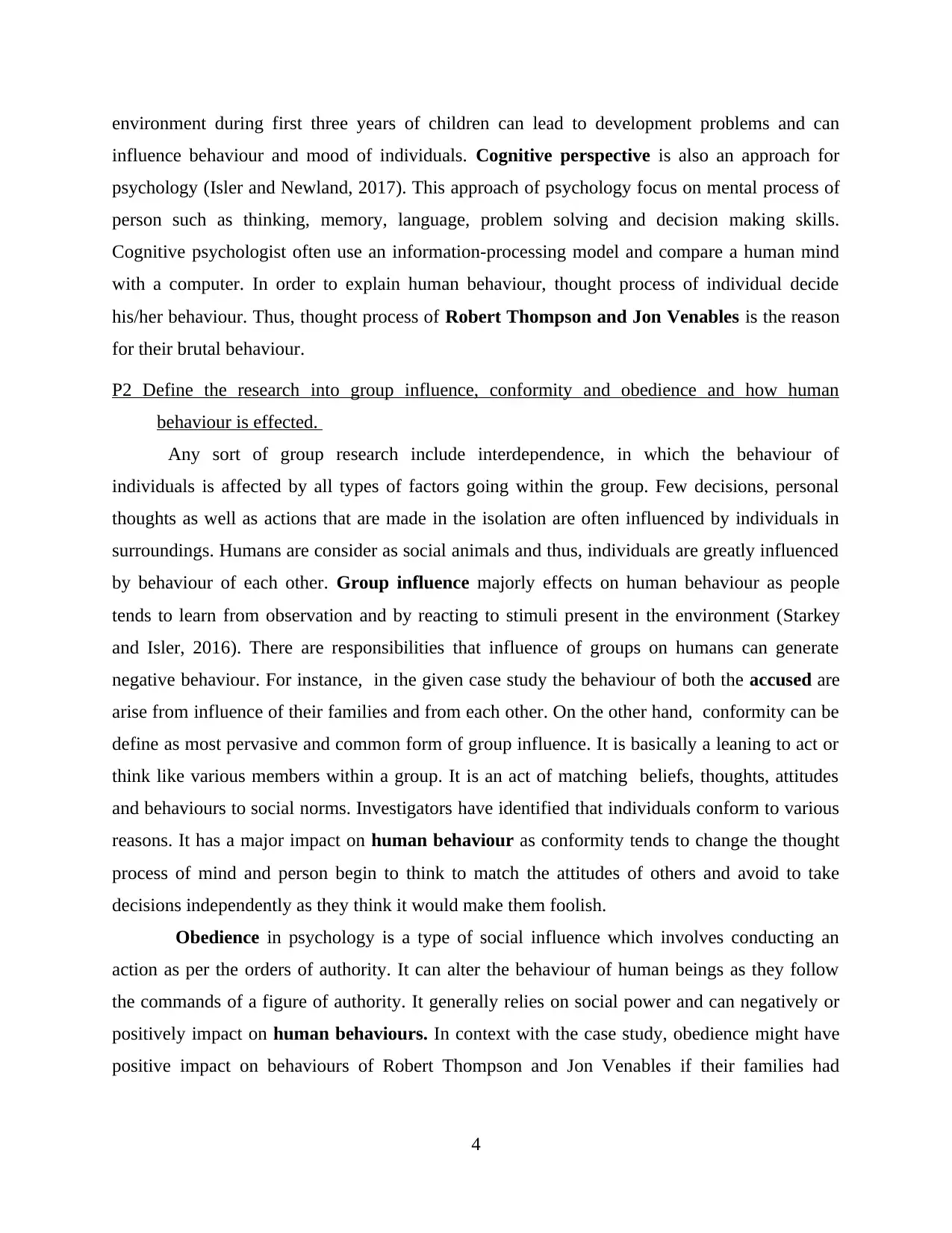
environment during first three years of children can lead to development problems and can
influence behaviour and mood of individuals. Cognitive perspective is also an approach for
psychology (Isler and Newland, 2017). This approach of psychology focus on mental process of
person such as thinking, memory, language, problem solving and decision making skills.
Cognitive psychologist often use an information-processing model and compare a human mind
with a computer. In order to explain human behaviour, thought process of individual decide
his/her behaviour. Thus, thought process of Robert Thompson and Jon Venables is the reason
for their brutal behaviour.
P2 Define the research into group influence, conformity and obedience and how human
behaviour is effected.
Any sort of group research include interdependence, in which the behaviour of
individuals is affected by all types of factors going within the group. Few decisions, personal
thoughts as well as actions that are made in the isolation are often influenced by individuals in
surroundings. Humans are consider as social animals and thus, individuals are greatly influenced
by behaviour of each other. Group influence majorly effects on human behaviour as people
tends to learn from observation and by reacting to stimuli present in the environment (Starkey
and Isler, 2016). There are responsibilities that influence of groups on humans can generate
negative behaviour. For instance, in the given case study the behaviour of both the accused are
arise from influence of their families and from each other. On the other hand, conformity can be
define as most pervasive and common form of group influence. It is basically a leaning to act or
think like various members within a group. It is an act of matching beliefs, thoughts, attitudes
and behaviours to social norms. Investigators have identified that individuals conform to various
reasons. It has a major impact on human behaviour as conformity tends to change the thought
process of mind and person begin to think to match the attitudes of others and avoid to take
decisions independently as they think it would make them foolish.
Obedience in psychology is a type of social influence which involves conducting an
action as per the orders of authority. It can alter the behaviour of human beings as they follow
the commands of a figure of authority. It generally relies on social power and can negatively or
positively impact on human behaviours. In context with the case study, obedience might have
positive impact on behaviours of Robert Thompson and Jon Venables if their families had
4
influence behaviour and mood of individuals. Cognitive perspective is also an approach for
psychology (Isler and Newland, 2017). This approach of psychology focus on mental process of
person such as thinking, memory, language, problem solving and decision making skills.
Cognitive psychologist often use an information-processing model and compare a human mind
with a computer. In order to explain human behaviour, thought process of individual decide
his/her behaviour. Thus, thought process of Robert Thompson and Jon Venables is the reason
for their brutal behaviour.
P2 Define the research into group influence, conformity and obedience and how human
behaviour is effected.
Any sort of group research include interdependence, in which the behaviour of
individuals is affected by all types of factors going within the group. Few decisions, personal
thoughts as well as actions that are made in the isolation are often influenced by individuals in
surroundings. Humans are consider as social animals and thus, individuals are greatly influenced
by behaviour of each other. Group influence majorly effects on human behaviour as people
tends to learn from observation and by reacting to stimuli present in the environment (Starkey
and Isler, 2016). There are responsibilities that influence of groups on humans can generate
negative behaviour. For instance, in the given case study the behaviour of both the accused are
arise from influence of their families and from each other. On the other hand, conformity can be
define as most pervasive and common form of group influence. It is basically a leaning to act or
think like various members within a group. It is an act of matching beliefs, thoughts, attitudes
and behaviours to social norms. Investigators have identified that individuals conform to various
reasons. It has a major impact on human behaviour as conformity tends to change the thought
process of mind and person begin to think to match the attitudes of others and avoid to take
decisions independently as they think it would make them foolish.
Obedience in psychology is a type of social influence which involves conducting an
action as per the orders of authority. It can alter the behaviour of human beings as they follow
the commands of a figure of authority. It generally relies on social power and can negatively or
positively impact on human behaviours. In context with the case study, obedience might have
positive impact on behaviours of Robert Thompson and Jon Venables if their families had
4
Paraphrase This Document
Need a fresh take? Get an instant paraphrase of this document with our AI Paraphraser
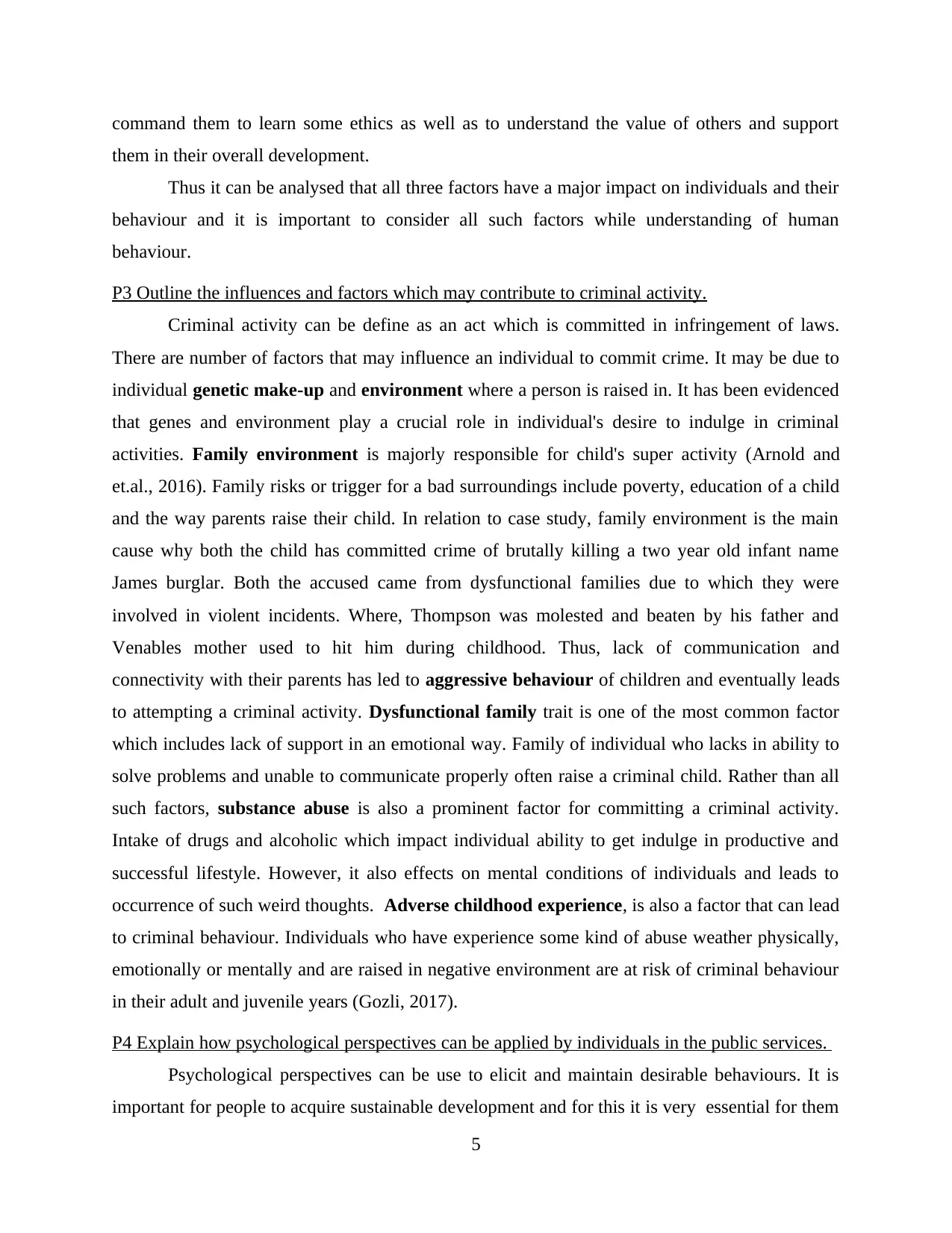
command them to learn some ethics as well as to understand the value of others and support
them in their overall development.
Thus it can be analysed that all three factors have a major impact on individuals and their
behaviour and it is important to consider all such factors while understanding of human
behaviour.
P3 Outline the influences and factors which may contribute to criminal activity.
Criminal activity can be define as an act which is committed in infringement of laws.
There are number of factors that may influence an individual to commit crime. It may be due to
individual genetic make-up and environment where a person is raised in. It has been evidenced
that genes and environment play a crucial role in individual's desire to indulge in criminal
activities. Family environment is majorly responsible for child's super activity (Arnold and
et.al., 2016). Family risks or trigger for a bad surroundings include poverty, education of a child
and the way parents raise their child. In relation to case study, family environment is the main
cause why both the child has committed crime of brutally killing a two year old infant name
James burglar. Both the accused came from dysfunctional families due to which they were
involved in violent incidents. Where, Thompson was molested and beaten by his father and
Venables mother used to hit him during childhood. Thus, lack of communication and
connectivity with their parents has led to aggressive behaviour of children and eventually leads
to attempting a criminal activity. Dysfunctional family trait is one of the most common factor
which includes lack of support in an emotional way. Family of individual who lacks in ability to
solve problems and unable to communicate properly often raise a criminal child. Rather than all
such factors, substance abuse is also a prominent factor for committing a criminal activity.
Intake of drugs and alcoholic which impact individual ability to get indulge in productive and
successful lifestyle. However, it also effects on mental conditions of individuals and leads to
occurrence of such weird thoughts. Adverse childhood experience, is also a factor that can lead
to criminal behaviour. Individuals who have experience some kind of abuse weather physically,
emotionally or mentally and are raised in negative environment are at risk of criminal behaviour
in their adult and juvenile years (Gozli, 2017).
P4 Explain how psychological perspectives can be applied by individuals in the public services.
Psychological perspectives can be use to elicit and maintain desirable behaviours. It is
important for people to acquire sustainable development and for this it is very essential for them
5
them in their overall development.
Thus it can be analysed that all three factors have a major impact on individuals and their
behaviour and it is important to consider all such factors while understanding of human
behaviour.
P3 Outline the influences and factors which may contribute to criminal activity.
Criminal activity can be define as an act which is committed in infringement of laws.
There are number of factors that may influence an individual to commit crime. It may be due to
individual genetic make-up and environment where a person is raised in. It has been evidenced
that genes and environment play a crucial role in individual's desire to indulge in criminal
activities. Family environment is majorly responsible for child's super activity (Arnold and
et.al., 2016). Family risks or trigger for a bad surroundings include poverty, education of a child
and the way parents raise their child. In relation to case study, family environment is the main
cause why both the child has committed crime of brutally killing a two year old infant name
James burglar. Both the accused came from dysfunctional families due to which they were
involved in violent incidents. Where, Thompson was molested and beaten by his father and
Venables mother used to hit him during childhood. Thus, lack of communication and
connectivity with their parents has led to aggressive behaviour of children and eventually leads
to attempting a criminal activity. Dysfunctional family trait is one of the most common factor
which includes lack of support in an emotional way. Family of individual who lacks in ability to
solve problems and unable to communicate properly often raise a criminal child. Rather than all
such factors, substance abuse is also a prominent factor for committing a criminal activity.
Intake of drugs and alcoholic which impact individual ability to get indulge in productive and
successful lifestyle. However, it also effects on mental conditions of individuals and leads to
occurrence of such weird thoughts. Adverse childhood experience, is also a factor that can lead
to criminal behaviour. Individuals who have experience some kind of abuse weather physically,
emotionally or mentally and are raised in negative environment are at risk of criminal behaviour
in their adult and juvenile years (Gozli, 2017).
P4 Explain how psychological perspectives can be applied by individuals in the public services.
Psychological perspectives can be use to elicit and maintain desirable behaviours. It is
important for people to acquire sustainable development and for this it is very essential for them
5
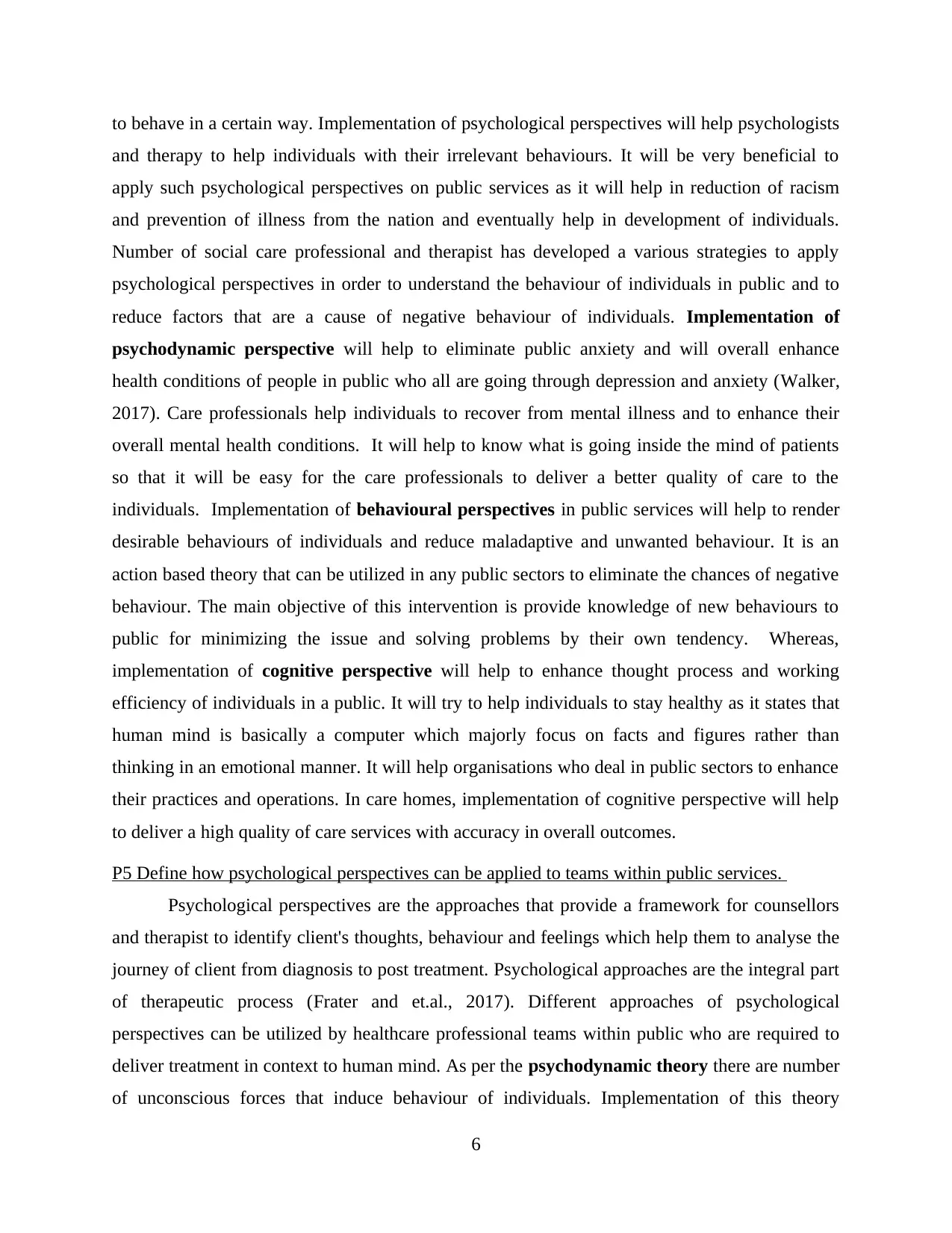
to behave in a certain way. Implementation of psychological perspectives will help psychologists
and therapy to help individuals with their irrelevant behaviours. It will be very beneficial to
apply such psychological perspectives on public services as it will help in reduction of racism
and prevention of illness from the nation and eventually help in development of individuals.
Number of social care professional and therapist has developed a various strategies to apply
psychological perspectives in order to understand the behaviour of individuals in public and to
reduce factors that are a cause of negative behaviour of individuals. Implementation of
psychodynamic perspective will help to eliminate public anxiety and will overall enhance
health conditions of people in public who all are going through depression and anxiety (Walker,
2017). Care professionals help individuals to recover from mental illness and to enhance their
overall mental health conditions. It will help to know what is going inside the mind of patients
so that it will be easy for the care professionals to deliver a better quality of care to the
individuals. Implementation of behavioural perspectives in public services will help to render
desirable behaviours of individuals and reduce maladaptive and unwanted behaviour. It is an
action based theory that can be utilized in any public sectors to eliminate the chances of negative
behaviour. The main objective of this intervention is provide knowledge of new behaviours to
public for minimizing the issue and solving problems by their own tendency. Whereas,
implementation of cognitive perspective will help to enhance thought process and working
efficiency of individuals in a public. It will try to help individuals to stay healthy as it states that
human mind is basically a computer which majorly focus on facts and figures rather than
thinking in an emotional manner. It will help organisations who deal in public sectors to enhance
their practices and operations. In care homes, implementation of cognitive perspective will help
to deliver a high quality of care services with accuracy in overall outcomes.
P5 Define how psychological perspectives can be applied to teams within public services.
Psychological perspectives are the approaches that provide a framework for counsellors
and therapist to identify client's thoughts, behaviour and feelings which help them to analyse the
journey of client from diagnosis to post treatment. Psychological approaches are the integral part
of therapeutic process (Frater and et.al., 2017). Different approaches of psychological
perspectives can be utilized by healthcare professional teams within public who are required to
deliver treatment in context to human mind. As per the psychodynamic theory there are number
of unconscious forces that induce behaviour of individuals. Implementation of this theory
6
and therapy to help individuals with their irrelevant behaviours. It will be very beneficial to
apply such psychological perspectives on public services as it will help in reduction of racism
and prevention of illness from the nation and eventually help in development of individuals.
Number of social care professional and therapist has developed a various strategies to apply
psychological perspectives in order to understand the behaviour of individuals in public and to
reduce factors that are a cause of negative behaviour of individuals. Implementation of
psychodynamic perspective will help to eliminate public anxiety and will overall enhance
health conditions of people in public who all are going through depression and anxiety (Walker,
2017). Care professionals help individuals to recover from mental illness and to enhance their
overall mental health conditions. It will help to know what is going inside the mind of patients
so that it will be easy for the care professionals to deliver a better quality of care to the
individuals. Implementation of behavioural perspectives in public services will help to render
desirable behaviours of individuals and reduce maladaptive and unwanted behaviour. It is an
action based theory that can be utilized in any public sectors to eliminate the chances of negative
behaviour. The main objective of this intervention is provide knowledge of new behaviours to
public for minimizing the issue and solving problems by their own tendency. Whereas,
implementation of cognitive perspective will help to enhance thought process and working
efficiency of individuals in a public. It will try to help individuals to stay healthy as it states that
human mind is basically a computer which majorly focus on facts and figures rather than
thinking in an emotional manner. It will help organisations who deal in public sectors to enhance
their practices and operations. In care homes, implementation of cognitive perspective will help
to deliver a high quality of care services with accuracy in overall outcomes.
P5 Define how psychological perspectives can be applied to teams within public services.
Psychological perspectives are the approaches that provide a framework for counsellors
and therapist to identify client's thoughts, behaviour and feelings which help them to analyse the
journey of client from diagnosis to post treatment. Psychological approaches are the integral part
of therapeutic process (Frater and et.al., 2017). Different approaches of psychological
perspectives can be utilized by healthcare professional teams within public who are required to
deliver treatment in context to human mind. As per the psychodynamic theory there are number
of unconscious forces that induce behaviour of individuals. Implementation of this theory
6
⊘ This is a preview!⊘
Do you want full access?
Subscribe today to unlock all pages.

Trusted by 1+ million students worldwide
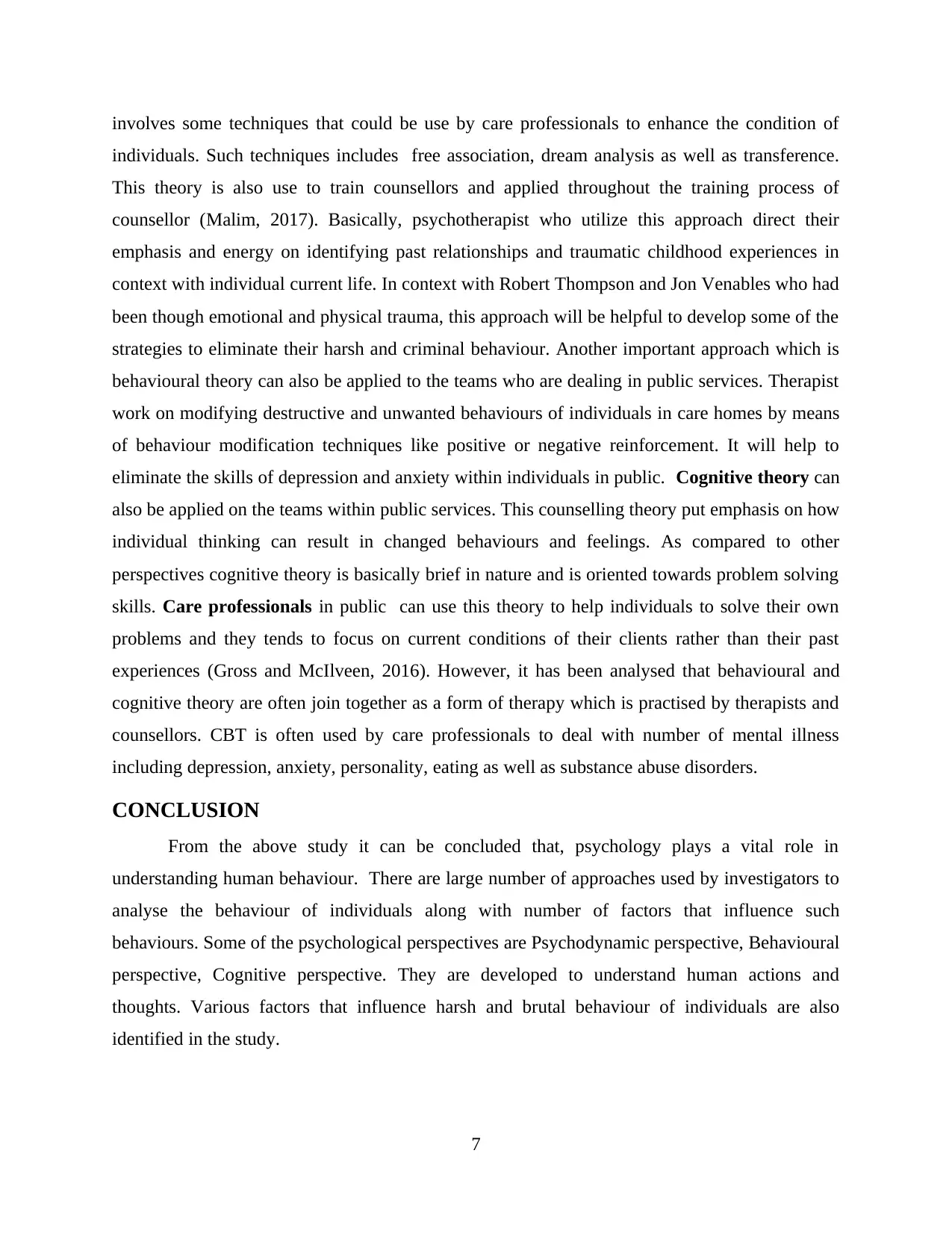
involves some techniques that could be use by care professionals to enhance the condition of
individuals. Such techniques includes free association, dream analysis as well as transference.
This theory is also use to train counsellors and applied throughout the training process of
counsellor (Malim, 2017). Basically, psychotherapist who utilize this approach direct their
emphasis and energy on identifying past relationships and traumatic childhood experiences in
context with individual current life. In context with Robert Thompson and Jon Venables who had
been though emotional and physical trauma, this approach will be helpful to develop some of the
strategies to eliminate their harsh and criminal behaviour. Another important approach which is
behavioural theory can also be applied to the teams who are dealing in public services. Therapist
work on modifying destructive and unwanted behaviours of individuals in care homes by means
of behaviour modification techniques like positive or negative reinforcement. It will help to
eliminate the skills of depression and anxiety within individuals in public. Cognitive theory can
also be applied on the teams within public services. This counselling theory put emphasis on how
individual thinking can result in changed behaviours and feelings. As compared to other
perspectives cognitive theory is basically brief in nature and is oriented towards problem solving
skills. Care professionals in public can use this theory to help individuals to solve their own
problems and they tends to focus on current conditions of their clients rather than their past
experiences (Gross and McIlveen, 2016). However, it has been analysed that behavioural and
cognitive theory are often join together as a form of therapy which is practised by therapists and
counsellors. CBT is often used by care professionals to deal with number of mental illness
including depression, anxiety, personality, eating as well as substance abuse disorders.
CONCLUSION
From the above study it can be concluded that, psychology plays a vital role in
understanding human behaviour. There are large number of approaches used by investigators to
analyse the behaviour of individuals along with number of factors that influence such
behaviours. Some of the psychological perspectives are Psychodynamic perspective, Behavioural
perspective, Cognitive perspective. They are developed to understand human actions and
thoughts. Various factors that influence harsh and brutal behaviour of individuals are also
identified in the study.
7
individuals. Such techniques includes free association, dream analysis as well as transference.
This theory is also use to train counsellors and applied throughout the training process of
counsellor (Malim, 2017). Basically, psychotherapist who utilize this approach direct their
emphasis and energy on identifying past relationships and traumatic childhood experiences in
context with individual current life. In context with Robert Thompson and Jon Venables who had
been though emotional and physical trauma, this approach will be helpful to develop some of the
strategies to eliminate their harsh and criminal behaviour. Another important approach which is
behavioural theory can also be applied to the teams who are dealing in public services. Therapist
work on modifying destructive and unwanted behaviours of individuals in care homes by means
of behaviour modification techniques like positive or negative reinforcement. It will help to
eliminate the skills of depression and anxiety within individuals in public. Cognitive theory can
also be applied on the teams within public services. This counselling theory put emphasis on how
individual thinking can result in changed behaviours and feelings. As compared to other
perspectives cognitive theory is basically brief in nature and is oriented towards problem solving
skills. Care professionals in public can use this theory to help individuals to solve their own
problems and they tends to focus on current conditions of their clients rather than their past
experiences (Gross and McIlveen, 2016). However, it has been analysed that behavioural and
cognitive theory are often join together as a form of therapy which is practised by therapists and
counsellors. CBT is often used by care professionals to deal with number of mental illness
including depression, anxiety, personality, eating as well as substance abuse disorders.
CONCLUSION
From the above study it can be concluded that, psychology plays a vital role in
understanding human behaviour. There are large number of approaches used by investigators to
analyse the behaviour of individuals along with number of factors that influence such
behaviours. Some of the psychological perspectives are Psychodynamic perspective, Behavioural
perspective, Cognitive perspective. They are developed to understand human actions and
thoughts. Various factors that influence harsh and brutal behaviour of individuals are also
identified in the study.
7
Paraphrase This Document
Need a fresh take? Get an instant paraphrase of this document with our AI Paraphraser
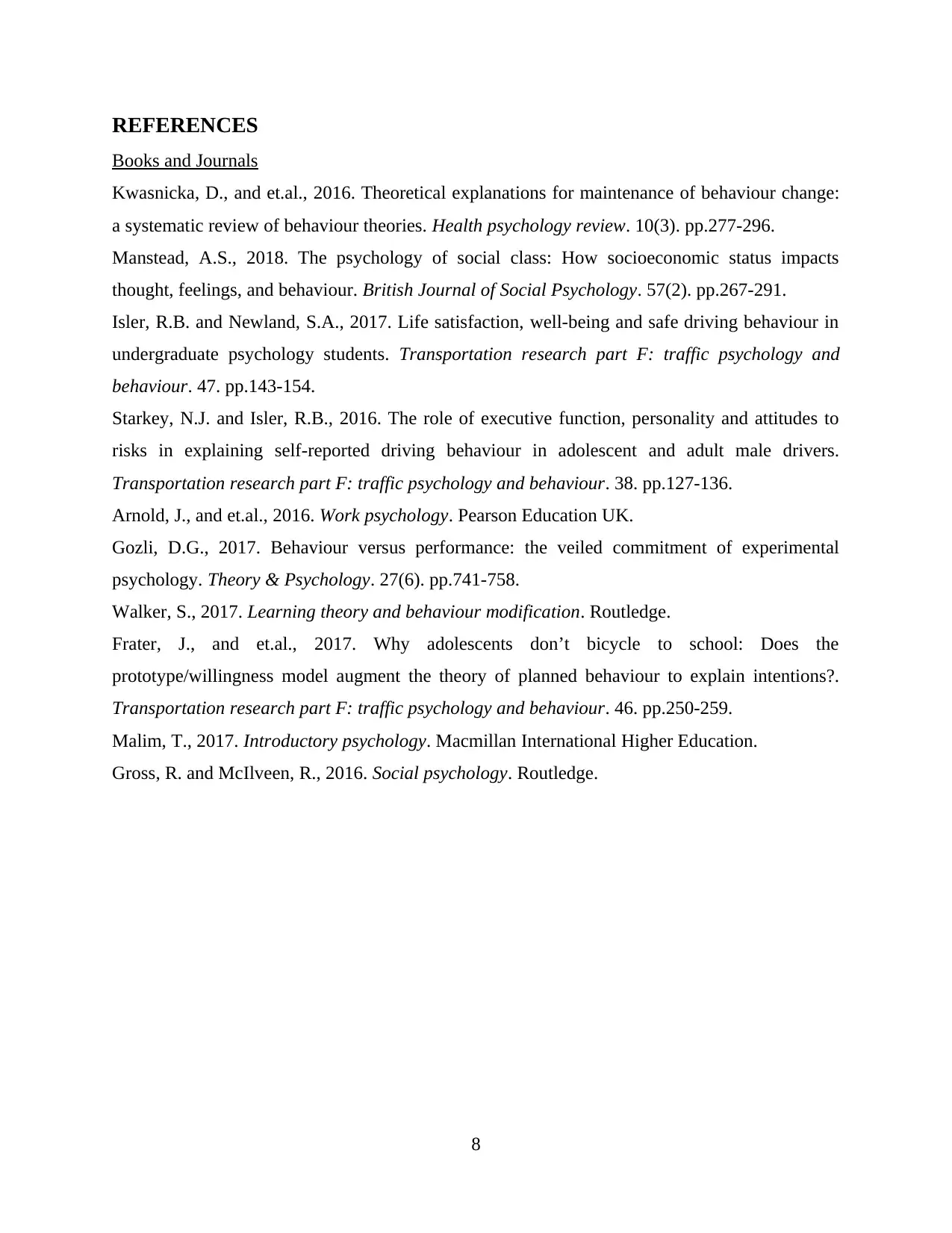
REFERENCES
Books and Journals
Kwasnicka, D., and et.al., 2016. Theoretical explanations for maintenance of behaviour change:
a systematic review of behaviour theories. Health psychology review. 10(3). pp.277-296.
Manstead, A.S., 2018. The psychology of social class: How socioeconomic status impacts
thought, feelings, and behaviour. British Journal of Social Psychology. 57(2). pp.267-291.
Isler, R.B. and Newland, S.A., 2017. Life satisfaction, well-being and safe driving behaviour in
undergraduate psychology students. Transportation research part F: traffic psychology and
behaviour. 47. pp.143-154.
Starkey, N.J. and Isler, R.B., 2016. The role of executive function, personality and attitudes to
risks in explaining self-reported driving behaviour in adolescent and adult male drivers.
Transportation research part F: traffic psychology and behaviour. 38. pp.127-136.
Arnold, J., and et.al., 2016. Work psychology. Pearson Education UK.
Gozli, D.G., 2017. Behaviour versus performance: the veiled commitment of experimental
psychology. Theory & Psychology. 27(6). pp.741-758.
Walker, S., 2017. Learning theory and behaviour modification. Routledge.
Frater, J., and et.al., 2017. Why adolescents don’t bicycle to school: Does the
prototype/willingness model augment the theory of planned behaviour to explain intentions?.
Transportation research part F: traffic psychology and behaviour. 46. pp.250-259.
Malim, T., 2017. Introductory psychology. Macmillan International Higher Education.
Gross, R. and McIlveen, R., 2016. Social psychology. Routledge.
8
Books and Journals
Kwasnicka, D., and et.al., 2016. Theoretical explanations for maintenance of behaviour change:
a systematic review of behaviour theories. Health psychology review. 10(3). pp.277-296.
Manstead, A.S., 2018. The psychology of social class: How socioeconomic status impacts
thought, feelings, and behaviour. British Journal of Social Psychology. 57(2). pp.267-291.
Isler, R.B. and Newland, S.A., 2017. Life satisfaction, well-being and safe driving behaviour in
undergraduate psychology students. Transportation research part F: traffic psychology and
behaviour. 47. pp.143-154.
Starkey, N.J. and Isler, R.B., 2016. The role of executive function, personality and attitudes to
risks in explaining self-reported driving behaviour in adolescent and adult male drivers.
Transportation research part F: traffic psychology and behaviour. 38. pp.127-136.
Arnold, J., and et.al., 2016. Work psychology. Pearson Education UK.
Gozli, D.G., 2017. Behaviour versus performance: the veiled commitment of experimental
psychology. Theory & Psychology. 27(6). pp.741-758.
Walker, S., 2017. Learning theory and behaviour modification. Routledge.
Frater, J., and et.al., 2017. Why adolescents don’t bicycle to school: Does the
prototype/willingness model augment the theory of planned behaviour to explain intentions?.
Transportation research part F: traffic psychology and behaviour. 46. pp.250-259.
Malim, T., 2017. Introductory psychology. Macmillan International Higher Education.
Gross, R. and McIlveen, R., 2016. Social psychology. Routledge.
8
1 out of 8
Related Documents
Your All-in-One AI-Powered Toolkit for Academic Success.
+13062052269
info@desklib.com
Available 24*7 on WhatsApp / Email
![[object Object]](/_next/static/media/star-bottom.7253800d.svg)
Unlock your academic potential
Copyright © 2020–2025 A2Z Services. All Rights Reserved. Developed and managed by ZUCOL.





